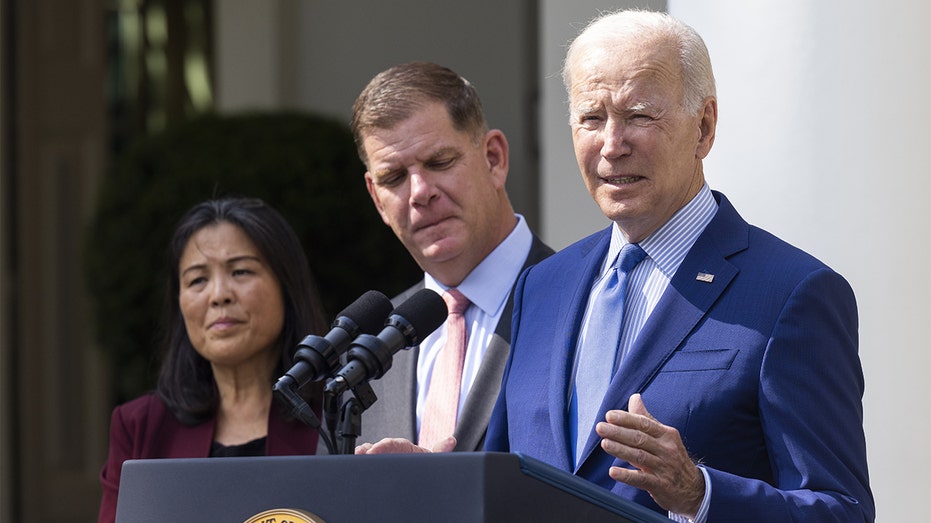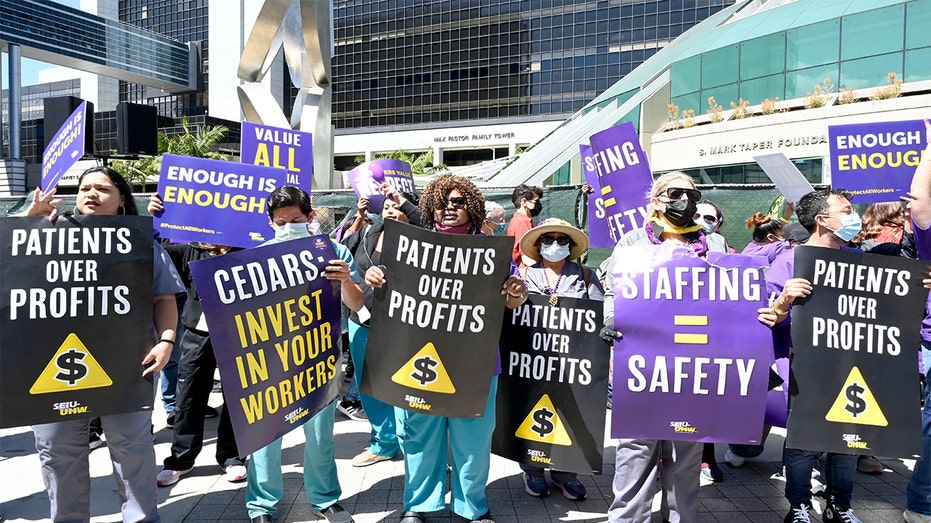Strikes becoming more common amid inflation, tight labor market
There were 180 strikes in first six months of 2022, according to Cornell University School of Industrial and Labor Relations
Tentative deal reached to avert railroad strike is ‘good’ for America: Alaska Governor
Alaska Governor Mike Dunleavy weighs in on the successfully averted railroad strike after hours of overnight negotiations on ‘Cavuto: Coast to Coast.’
More workers across a range of industries are going on strike, seeking pay raises to catch up to inflation while the tight labor market has taken away some of the risk of walking off the job.
In the past few weeks, thousands of teachers in Ohio and Washington, nursing-home workers in Pennsylvania and mental-health therapists in California have walked picket lines after contract negotiations broke down over wages and other issues. Other workers have held daylong walkouts as they try to unionize coffee shops, distribution centers and other workplaces.
There were 180 strikes involving roughly 78,000 workers in the first six months of this year, up from 102 involving 26,500 workers in the same period a year earlier, according to a strike tracker created by researchers at the Cornell University School of Industrial and Labor Relations.

Delta Air Lines pilots picket at John F. Kennedy International Airport in Queens, New York on June 30, 2022 (Sumner Park / Fox News)
BIDEN TO ‘BLAME’ FOR WHAT COULD’VE BEEN A ‘DISASTROUS’ RAILROAD STRIKE: FREEDOM FOUNDATION CEO
More unions and employers are also entering into tough contract deliberations, with the potential for strikes looming. Workers’ demands include higher pay to account for inflation as well as better conditions, reflecting how the pandemic has reshaped jobs and many people’s attitudes about their work.
This past week, a tentative deal brokered by the Biden administration averted a strike of railroad workers that had been set to begin Friday, largely over scheduling and work-life balance issues. A strike would have disrupted swaths of the economy, from mining and agriculture to commuter rail service. The agreement, yet to be approved by the unions, would provide a 24% pay increase over five years.
"As long as the job market remains good and people can find jobs and inflation is high, there’s less risk for going out on strike," said Arthur Wheaton, director of labor studies at Cornell’s School of Industrial and Labor Relations.

Locomotive's are coupled to railway cars at the Selkirk rail yard Wednesday, Sept. 14, 2022, in Selkirk, N.Y. (AP Photo/Hans Pennink) (AP Photo/Hans Pennink / AP Newsroom)
After additional work stoppages this summer, the total number of strikes this year has grown to 267.
That includes 72 walkouts at coffee shops owned by Starbucks Corp. and nine at Amazon.com Inc. facilities, amid an uptick in union organizing campaigns this year.
| Ticker | Security | Last | Change | Change % |
|---|---|---|---|---|
| SBUX | STARBUCKS CORP. | 95.80 | +0.04 | +0.04% |
| AMZN | AMAZON.COM INC. | 204.86 | +0.07 | +0.03% |
For employers, the combination of high inflation, running at an 8.3% pace in August, and national unemployment of 3.7% is putting more pressure on labor negotiations.
NATIONAL STRIKE THREATS LOOM AS LABOR UNIONS BECOME MORE EMBOLDENED
In the tight labor market, when hiring is difficult and turnover is high, companies also face questions about how much they can increase wages to meet workers’ expectations when the threat of a recession is looming, said Michael Lotito, co-chairman of the Workplace Policy Institute at Littler, a law firm that represents employers during contract negotiations.
"This is a very, very contentious time," he said. "It’s pretty damn difficult to figure out what you’re going to agree to."

President Biden speaks in the Rose Garden of the White House in Washington, D.C., on Thursday, Sept. 15, 2022. To announce an aversion of the planned railroad strike. (Jim Lo Scalzo/EPA/Bloomberg via Getty Images / Getty Images)
Mr. Lotito said he thinks many unions will now look to the wage increases in the tentative railroad agreement as a measure of successful bargaining. "I think that is going to embolden unions to ask for more," he said.
He and others also say emotions are running high among many workers after more than two years of the Covid-19 pandemic, because their jobs got harder or more dangerous, or because they don’t feel that they got the respect they deserved from employers.
Those frustrations are especially evident in the healthcare sector, where the pandemic took an emotional toll on nurses and others.
This week in Minnesota, more than 15,000 nurses at 13 hospitals in Minneapolis-St. Paul and Duluth went on strike for three days seeking a wage increase of 30% over three years. They returned to work without resolving the contract dispute.

Nurses strike Monday, Sept. 12, 2022 outside North Memorial Health Hospital in Robbinsdale, Minn. Nurses launched a three-day strike over issues of pay and what they say is understaffing that has been worsened by the strains of the coronavirus pandem (Associated Press / AP Newsroom)
In Pennsylvania, 700 nursing-home workers employed by three companies ended a week-long strike on Tuesday. The union, SEIU Healthcare Pennsylvania, walked away with average raises of 9% in the first year, up to 18% by the end of the three-year contract. Pay for some starting positions rose to $17 an hour from $13. The union also won nurse-to-patient ratios it had sought.
US LABOR UNIONS HAVE HIGHEST APPROVAL RATING IN NEARLY 6 DECADES
Shelley Robinson, a certified nursing assistant at a nursing home in Lancaster, Pa., said she would get a raise in the first year of $2.75 an hour from her current pay of just over $20 an hour.
Ms. Robinson, who said she cares for up to 30 patients at a time, recalled how Covid "swept like wildfire" through her facility two years ago. She also said she has seen her weekly grocery bill for herself and her two children climb $50 this year.
"This increase was necessary for us," she said.
Representatives of the companies couldn’t immediately be reached for comment.

Members of the Service Employees International Union-United Healthcare Workers West held a picket line on day one of a weeklong planned strike. (Brittany Murray/MediaNews Group/Long Beach Press-Telegram via Getty Images / Getty Images)
More than 2,000 mental-health therapists in California and Hawaii have been on strike for a month at healthcare system Kaiser Permanente. The union says it will accept pay increases of 4% in the first year of the contract and 3% in the second and third years. But it says it wants Kaiser to cut the time it takes patients to schedule appointments, which the union says can take eight weeks or more in some cases.
"People can’t provide the care that’s needed," said Sal Rosselli, president of the National Union of Healthcare Workers, whose members have been picketing in Sacramento, Fresno and Oakland as temperatures surpassed 100 degrees on some days.
A Kaiser spokesman said it has addressed workers’ top concerns about pay and workloads and that the strike never needed to take place because both sides had been making progress.
"It is time for this strike to end," the spokesman said. "We have sincerely listened to our therapists’ priorities and responded to the demands of their union representatives."
GET FOX BUSINESS ON THE GO BY CLICKING HERE
The surge in strikes this year has yet to reach the levels seen in 2018 when there were massive teachers strikes in West Virginia, Kentucky, Oklahoma, and other states. That year, more than 500,000 teachers and other workers went on strike, according to a Cornell researcher.
A long-running strike of 1,100 miners at an Alabama coal mine that started on April 1, 2021, also has shown no signs of being resolved soon.




















